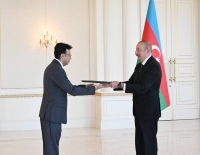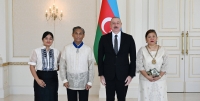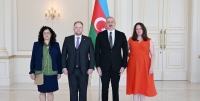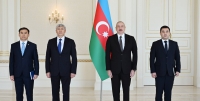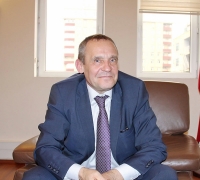Caspian Energy (CE): Your Excellency, Kazakhstan is one of the largest regional markets among the Caspian region countries. What advantages do you see in this for the growth of the investment potential and turnover between the two countries, as well as between the Central Asian and Baltic region in general? In which sectors do you see a key potential?
Jurijs Pogrebnyak, Ambassador Extraordinary and Plenipotentiary of Latvia to Kazakhstan: Our bilateral economy is developing steadily. There are no serious failures, neither is an economic breakthrough. In the first half of 2018, the volume of the bilateral trade reduced by 2.34% as compared to the same period of 2017. It means that we don’t use the entire potential of the trade-economic cooperation. A more diversified export market will help Kazakhstan to increase trade flows and at the same time ensure sustainability towards the economic shocks. Organization of transit and logistical services, vehicular and railway transportation, air transportation, cooperation in introduction of digital and green technologies, as well as traditional sectors such as food products, pharmaceuticals, agriculture and tourism are prospects of cooperation between Latvia and the region. Cooperation in the field of higher education is another promising area.
We are particularly pleased that a direct regular air flight has been opened between Latvia and Kazakhstan. Since April 29 the airBaltic company has started making regular flights between Riga and Almaty three times a week (in summer season).
CE: How does Kazakhstan’s participation in the Eurasian Economic Union (EEU) contribute to the investment turnover and trade relations with the EU and Latvia?
Jurijs Pogrebnyak: Bilateral trade relations of Latvia are closely linked to the trade policy of the European Union (EU). The expanded agreement on partnership and cooperation is regulating trade relations between the EU and Kazakhstan. While the EU is considering possibilities of cooperation with the EEU, we cannot, at this stage, pass sentence regarding its economic impact.
In the last 28 years, we have established close cooperation between Latvia and Kazakhstan, based on mutual understanding and common vision of prerequisites required for modern development: transparency and mutual respect. It promotes successful economic cooperation which promotes strong platform for further joint achievements.
Kazakhstan is a large trade partner of Latvia in the region. Kazakhstan has wonderful advantages such as a well-developed infrastructure, as well as relations with China and neighbor countries of Central Asia. In our case, given our perfect geographic location and developed infrastructure, Latvia is a bridge into the broader north-European region.
Geographic advantages and fruitful cooperation between Latvia and Kazakhstan is the key towards the cooperation of our countries. At present, Kazakhstan is the 23rd in the rating of foreign direct investments of Latvia. Latvia and Kazakhstan have 174 joint ventures. In general, it is a good indicator.
CE: What role has the Caspian status settlement played or will play in bilateral economic and business relations?
Jurijs Pogrebnyak: The agreement on the Caspian Sea status will open a new chapter of cooperation in the field of transport, trade and energy for the region and the whole world. New opportunities and an organized business environment always attract new investments.
CE: How do you see the possibility of building bridge systems connecting the eastern and western shores of the Caspian Sea? How can it contribute to the development of economies of the two regions?
Jurijs Pogrebnyak: It is, certainly, serious intentions and big investments which require a thorough study and careful thought. But such modernization of transportation networks will facilitate cross-border trade and transport flows.
CE: Do Latvia and EU plan, in general, to increase purchase of Kazakhstani energy resources?
Jurijs Pogrebnyak: At present, the EU is actively working over diversification of sources and routes of gas supply, including the development of the Southern Gas Corridor. Accordingly, we are open to new, competitive proposals on energy supply.
CE: How are the transport lines developing within the framework of the Viking and Zubr projects? Is their further development in the direction of South-East Asia (China, India, Pakistan, etc) possible?
Jurijs Pogrebnyak: Container train “Zubr” which provides entry from the Black Sea region into North Europe is one of the stable projects of cooperation. Transportation commenced in 2009. The route is based on cooperation of the Latvian, Belarusian and Ukrainian railway companies in the field of freight forwarding and transport. Unlike the Viking route (it provides a link to the port of Klaipeda), Zubr route provides a link to a much broader region – Latvia, Estonia and Scandinavia. Regular ferry lines link ports of Latvia and Estonia with Stockholm, Helsinki and Travemunde. Besides, several container lines and ro-ro lines link ports of Latvia to other ports of the Baltic and North seas. In 2017, Zubr container train transported 6,435 TEU containers, which is 40% higher than the figure of 2016. The highest volume of cargoes is transported along the Latvian and Belarusian railways.
At the same time, the Latvian railway enterprise LDZ Logistics Ltd is actively working to fill in the railway route with the “Baltica Tranzit” container train in 2018. The route of container transportation links the Baltic countries with the Central Asian countries (Kazakhstan, Uzbekistan, Turkmenistan, Kyrgyzstan and Tajikistan).
Latvia considers Central Asia one of the priority regions for cooperation in the context of development of transport corridors, and Kazakhstan plays one of the key roles in this cooperation. Cooperation between Latvia and Kazakhstan in the field of transport and logistics, including the development of the transport corridor, is very active. We are supporting an activity promoting further development of corridors in the direction of China, India, Afghanistan and Pakistan. It will strengthen Kazakhstan as a transit country and create opportunities for additional cargo transportation, including between Kazakhstan and Latvia.
Thank you for the interview





